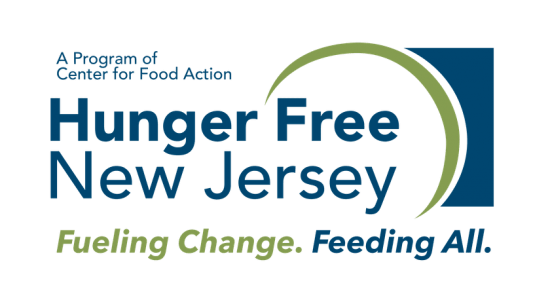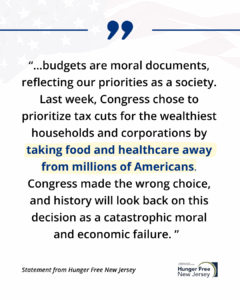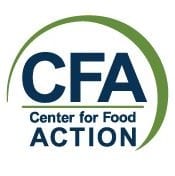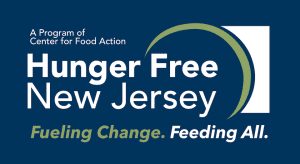Fewer New Jersey children received afterschool suppers in 2020 – the second year in a row that the state headed in the wrong direction in serving low-income children this important meal, according to a national report released today.
New Jersey now ranks 27th nationwide for serving afterschool suppers, reaching only 3 percent of low-income children who receive free or low-cost school lunch, according to the Food Research & Action Center (FRAC) report, Afterschool Suppers: A Snapshot in Participation.
“We know that more people have faced hunger during the pandemic,’’ said Adele LaTourette, director, Hunger Free New Jersey. “That more communities are not maximizing child participation in this federally-funded program is a real loss, both in terms of feeding hungry New Jersey children and in the federal dollars left on the table.’’
LaTourette acknowledged that many afterschool programs were closed in October 2020, which is the month the data is based on, measuring participation in two federal programs – Child and Adult Care Food Program (CACFP) and Summer Food Service Program (SFSP). But, the USDA has relaxed rules to make it easier for schools, local government and community organizations to serve afterschool snacks and suppers. This includes allowing parents to pick up multiple meals at a time, even when a school or program is closed.
“There is every reason for schools, local government and community organizations to participate in these programs,’’ LaTourette said. “It’s a win-win for children, families and communities.’’
In October 2020, New Jersey communities fed an average of 13,371 children afterschool suppers, according to FRAC, down from 19,000 in 2019 – a nearly 30% drop.
FRAC sets a benchmark for serving supper to at least 15 percent of low-income students who eat lunch at school. If New Jersey had met that goal, communities could have collected an additional $3.5 million in federal reimbursements in October 2020 alone and fed an additional 66,000 children each day, the report found.
Afterschool nutrition programs play a key role in reducing hunger and supporting quality afterschool enrichment programs, research shows. The programs are typically sponsored by schools, local government recreation departments and community organizations that operate afterschool programs.
LaTourette said the New Jersey Department of Agriculture, which administers the program on the state level, should take steps to understand the decline, while also stepping up efforts to engage more organizations, especially school districts, to serve afterschool snacks and suppers during the pandemic.
“We look forward to working with the department and our many partners to turn the tide on afterschool meals and make sure that all children have enough food to eat, every single day,’’ LaTourette said.
###
For 50 years, the Food Research & Action Center has been the leading national nonprofit organization working to eradicate poverty-related hunger and undernutrition in the United States.
Hunger Free New Jersey is the state’s leading private, non-profit advocacy organization working to ensure all New Jersey residents have healthy food to eat, every single day.






